Erik Martin
UMBC Faculty-Led: Intercultural Communication in Morocco and Spain
Major: Psychology
May 24, 2024 – Pre-Departure
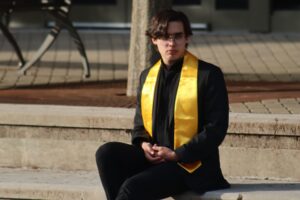 Hey everyone! I’m Erik Martin, and I’ll be taking you along my experience with Intercultural Communication in Morocco and Spain. Currently, though, I’ve had something bigger to worry about: I’m graduating! I am finally earning a Bachelor of Science in Psychology and walking the stage after three long years of classes and hundreds of Blackboard submissions. I can’t help but think about the community that I’ve built here and the amount of personal change that I have been through while attending this school. Though it hurts to say goodbye to a place that was so central to my entire adult life, I could not be more excited to start the next chapter. Paying rent and starting a career may sound boring, but to me, this is an opportunity to create the foundation for the rest of my life.
Hey everyone! I’m Erik Martin, and I’ll be taking you along my experience with Intercultural Communication in Morocco and Spain. Currently, though, I’ve had something bigger to worry about: I’m graduating! I am finally earning a Bachelor of Science in Psychology and walking the stage after three long years of classes and hundreds of Blackboard submissions. I can’t help but think about the community that I’ve built here and the amount of personal change that I have been through while attending this school. Though it hurts to say goodbye to a place that was so central to my entire adult life, I could not be more excited to start the next chapter. Paying rent and starting a career may sound boring, but to me, this is an opportunity to create the foundation for the rest of my life.
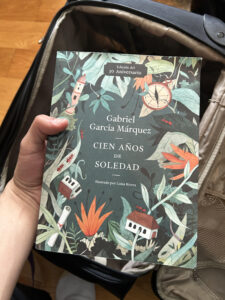 Before fully saying goodbye to UMBC and becoming a “real” adult, I have one more adventure to go on. As I pack up my dorm, I already have started repacking for my time in Morocco. I pack a few articles of clothing that I can mix and match, making sure that I don’t overfill my bag with clothes I won’t wear. I’m bringing my laptop to help me with my work – this is study abroad, so I will be taking a class – and with a few other tasks. For entertainment, I have “A Hundred Years of Solitude” by Gabriel Garcia Marquez in its original Spanish, a book I have always wanted to read. I hope that the time away from my normal routine will help me explore some interests and projects that I normally feel too busy to look into.
Before fully saying goodbye to UMBC and becoming a “real” adult, I have one more adventure to go on. As I pack up my dorm, I already have started repacking for my time in Morocco. I pack a few articles of clothing that I can mix and match, making sure that I don’t overfill my bag with clothes I won’t wear. I’m bringing my laptop to help me with my work – this is study abroad, so I will be taking a class – and with a few other tasks. For entertainment, I have “A Hundred Years of Solitude” by Gabriel Garcia Marquez in its original Spanish, a book I have always wanted to read. I hope that the time away from my normal routine will help me explore some interests and projects that I normally feel too busy to look into.
That’s not to say I won’t be busy, though. Within the first week, we will go from the international hub of Casablanca to the millennial cultural center of Fez to the desert surrounding the imposing Atlas Mountains. Professors Elisabeth Arevalo-Guerrero and Samir El Omari have lived in Spain and Morocco respectively, and their knowledge of our host countries have allowed us to have some amazing opportunities. I could not imagine a better way to learn about intercultural communication than this, and I am prepared to learn a lot.
To prepare for this trip, I’ve been brushing up on my language skills. For Arabic, I am
truly hopeless when it comes to speech comprehension, though I can read very basic phrases. If
you’re looking to learn a language before going to a new country, I recommend looking for a
grammar book or online worksheets. Sites like Duolingo only go so far, and they often don’t help
you understand why you say certain things. I know a good amount of Spanish from speaking it
with family and friends, though I am unsure if anyone from Spain will understand my accent.
This makes me start to think about how people will see me outside of the US. I am a
Mexican-American, which means that I live somewhere between two cultural worlds, using
values and traditions from both in my everyday life. In psychology, this is called biculturalism; in fact, I am researching what it means to be bicultural with the Culture, Child, and Adolescent Development Lab here at UMBC. You might have an experience with this! Many of my friends also experience this, including some of the people in this very program. I fully expect most of us to only be seen as Americans, but I wonder how additional ethnic and cultural identities will impact how we interact with people. I also am looking forward to understanding different identities within Morocco and Spain; maybe the bicultural experience is different in different places?
That’s enough of my ramblings. I should probably pack and prepare instead of talking about all of the packing and preparing I have to do. Thanks for reading and I’ll let you know when I touch down in Morocco!
May 24, 2024 – Arrival
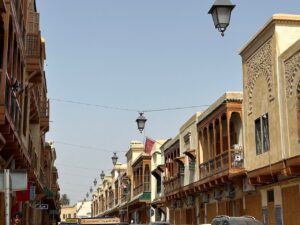 Salaam aleikum from Fez, Morocco! It’s been about four days since I left the United States, and I cannot begin to explain everything that has happened so far. I can try, though.
Salaam aleikum from Fez, Morocco! It’s been about four days since I left the United States, and I cannot begin to explain everything that has happened so far. I can try, though.
Our flight to Morocco mostly went off without incident. We arrived at the airport, and after fumbling though long lines and security checks we all met at our gate. Our group is surprisingly diverse, perfect for learning about intercultural communication. Shortly after saying our helloes, we filed onto the plane for our seven-hour flight across the Atlantic. I was lucky to have a window seat next to a Moroccan-American couple and their children visiting family after half a decade of separation. We spent much of the flight talking about what Morocco was like, what they missed, and what I was looking forward to in between naps and meals. The father tries to take care of me, translating for the flight attendants and repeatedly asking if there is anything I need. I feel reassured knowing that I am going to the same place as them.
After landing in Casablanca and working our way out of the airport, we were taken by bus further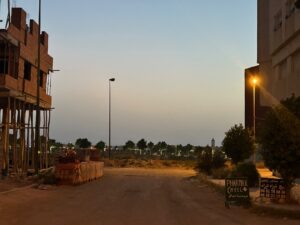 inland to Fez, where we arrived at the Ibn al Ghazi Institute. The institute gave us a warm welcome of a three-course meal full of olives, dates, and roasted chicken with a group of drummers playing for us. It was incredibly kind and thoughtful, to the point where I felt very self-conscious about how I was still in the same sweatpants I had been wearing for 48 hours straight. I wish I was able to properly express my gratitude to the institute and the people that work there.
inland to Fez, where we arrived at the Ibn al Ghazi Institute. The institute gave us a warm welcome of a three-course meal full of olives, dates, and roasted chicken with a group of drummers playing for us. It was incredibly kind and thoughtful, to the point where I felt very self-conscious about how I was still in the same sweatpants I had been wearing for 48 hours straight. I wish I was able to properly express my gratitude to the institute and the people that work there.

Since that night, it has been a blur of tours, visits, and lessons, with a few short moments to rest andsettle in. It’s hot but dry, so 70 degrees here is much better than 70 degrees back in Maryland. That being said, it’s about 95 degrees while I write this. The arid landscape is dotted with the occasional fruit, olive, or palm tree with a few bushes or weeds in between. There are also plenty of stray cats and dogs – we have to herd month-old kittens away from our door to even enter our apartment. We discussed bringing some of them back more than once.
Though I am glad I already learned the alphabet, my minimal Arabic knowledge is almost useless here. Moroccan Arabic is a unique dialect that has fewer online resources, so I am resorting to bothering Professor Omari, the institute staff, the bus driver, and everyone else for basic words and phrases. Other than that, I make my way through the city going, “English? ¿Español?” with an occasional “pardon moi” (most people understand French) or “balakh” (and Arabic equivalent to “watch out!”). Buying things becomes a game of charades, with both me and the shopkeepers using a few words of each other’s languages to try and come to an understanding. The professors say that prices are negotiated, and bargaining is the norm, but I unfortunately don’t understand enough to try. Eventually, I hope to get scammed because of my poor bargaining skills, instead of getting scammed because I’m an American.
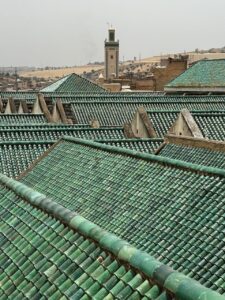 Speaking of which, I found out how we are perceived: we are Americans, 100%. Our English and fashion make us easily identifiable; though most people are used to Americans within the city, on the outskirts we are a rare sight. What I have found, though, is the rich variety of different cultures in Morocco. From the Arab majority that came with the rise of Islam during the 600s, to the Jewish communities that fled Spain during the Reconquista, to the different Berber tribes that have lived in the mountains for millennia, Morocco is made up of countless unique ethnic groups that are hard to perceive from the outside. When I was first thinking about different cultural identities, I considered how immigrant groups would impact one’s identity, since that’s what most American subcultures are based on. I’m glad I was able to realize how many different cultures could come from the same place, and I hope that I will be able
Speaking of which, I found out how we are perceived: we are Americans, 100%. Our English and fashion make us easily identifiable; though most people are used to Americans within the city, on the outskirts we are a rare sight. What I have found, though, is the rich variety of different cultures in Morocco. From the Arab majority that came with the rise of Islam during the 600s, to the Jewish communities that fled Spain during the Reconquista, to the different Berber tribes that have lived in the mountains for millennia, Morocco is made up of countless unique ethnic groups that are hard to perceive from the outside. When I was first thinking about different cultural identities, I considered how immigrant groups would impact one’s identity, since that’s what most American subcultures are based on. I’m glad I was able to realize how many different cultures could come from the same place, and I hope that I will be able
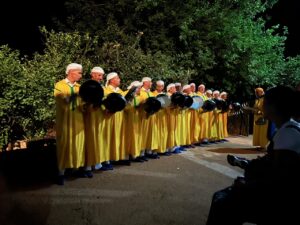
to fully appreciate all of the cultural values and practices that make Morocco so unique. I have so many more memories that I couldn’t fit here, like our night under the stars, the food, the wedding we almost went to, the child that beat me up and said bruh, the historical sites, and the incredibly helpful people, but this is long enough. Next week, I hope to cover a bit more about our activities and classes. Goodbye for now!
June 7, 2024
Study Abroad Ambassador Post – A Day in the Life
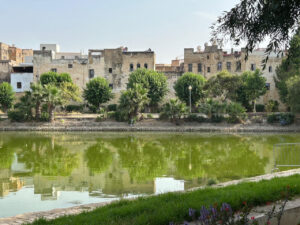 Instead of starting off with some analysis of my time here, I want to take you through what a normal day in the program looks like. We’ve had classes consistently, and by now we are more familiar with the area, the language, and the culture.
Instead of starting off with some analysis of my time here, I want to take you through what a normal day in the program looks like. We’ve had classes consistently, and by now we are more familiar with the area, the language, and the culture.
We arrive at the Ibn al-Ghazi Institute around 9 for breakfast. Breakfast here is mostly an assortment of breads served with nuts, olives, and spreads. There’s also a big culture here surrounding tea (shay or ‘atay) and coffee (qahwah), served in smaller glasses but more concentrated. Even when it’s 90 degrees outside, it’s still served hot.
After breakfast, we spend a few hours in class. Our first class is Intro to Intercultural Communication with Professor Arévalo-Guerrero, a very self-explanatory name. We learn about how people learn the customs of a new culture, the effects of biases, methods for working in teams with diverse backgrounds, and more. Given that I hope to research cultural experiences from a psychological perspective, I am loving this class and trying to remember as much as I can. 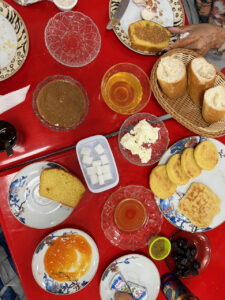
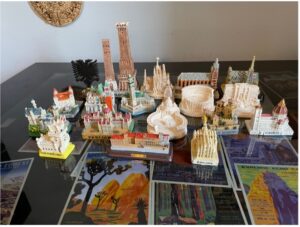 Our second class is Moroccan Life, History, and Culture with Professor Omari. He was born and raised in Morocco, so he speaks with authority about the language or culture. Most of his class is spent talking about specific interactions we had, and then exploring the context in which they happened – it helps us understand the cultural values here in Morocco and how they affect everyday life. It almost feels like a debrief you have after a messy social function, only more academic. He also uses his class to introduce us to certain aspects of Moroccan culture, such as music and basic social norms. It might be nerdy to say, but somehow I find myself excited about the classes when studying abroad.
Our second class is Moroccan Life, History, and Culture with Professor Omari. He was born and raised in Morocco, so he speaks with authority about the language or culture. Most of his class is spent talking about specific interactions we had, and then exploring the context in which they happened – it helps us understand the cultural values here in Morocco and how they affect everyday life. It almost feels like a debrief you have after a messy social function, only more academic. He also uses his class to introduce us to certain aspects of Moroccan culture, such as music and basic social norms. It might be nerdy to say, but somehow I find myself excited about the classes when studying abroad.
After classes, we generally have free time for lunch. I generally use this time to run to one of the three corner stores placed right next to the institute and get a mint Sprite. Most drinks here have a minty flavor, and I will definitely miss this flavor when going back to the US. The rest of lunch is spent talking to the other students from UMBC. We have such a diverse group in ethnicity, field of study, and ideology, and I’ve been interested in seeing what people are hoping to get from this experience. Some people are hoping to apply what they’ve learned about language and culture, others are trying to break out of their comfort zone, and others are experiencing their first time outside of the US.
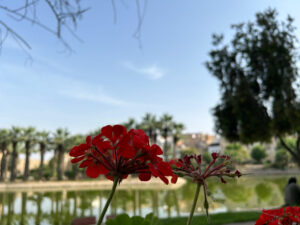 Lunch is the end of our “standard” day, but we normally have one more thing to do before getting free. We visited the royal gardens, talked to artisans keeping their traditions alive, watched a presentation from local high schoolers on the area, and listened to a showcase of traditional Andalusian music. We spent a few of our afternoons exploring the medina, a massive stretch of winding streets that make up the original city of Fez. The city was designed to be an unmappable maze that would be impossible to invade – even in the 20th century, over a thousand years after the city was founded, French colonization never fully controlled the medina of Fez. It’s easy to get lost, especially when you don’t fully understand the local language and a hundred people are trying to sell you something. If you don’t go in with a goal and a way to leave, you might never leave.
Lunch is the end of our “standard” day, but we normally have one more thing to do before getting free. We visited the royal gardens, talked to artisans keeping their traditions alive, watched a presentation from local high schoolers on the area, and listened to a showcase of traditional Andalusian music. We spent a few of our afternoons exploring the medina, a massive stretch of winding streets that make up the original city of Fez. The city was designed to be an unmappable maze that would be impossible to invade – even in the 20th century, over a thousand years after the city was founded, French colonization never fully controlled the medina of Fez. It’s easy to get lost, especially when you don’t fully understand the local language and a hundred people are trying to sell you something. If you don’t go in with a goal and a way to leave, you might never leave.
After such a full day, we have to start thinking about dinner. Interestingly, there are only a few restaurants for traditional Moroccan food here – I think it’s because dinner is traditionally served on one massive plate that an entire table shares, but there could be plenty of other reasons. Most restaurants are French or American, so you can find plenty of paninis and fried chicken. My roommates and I have grown a newfound appreciation for Pizza Hut abroad. Sometimes you need to eat 80 dirhams (about $8 in the US) of pure grease to feel American again. We then go home, work on a few assignments, make calls home, and go to bed around 12 or 1 AM. 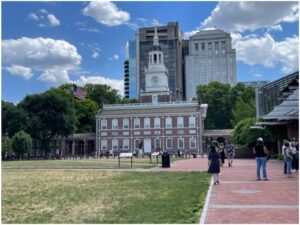
Since I’ve been studying cultural immersion and experiencing a new culture for a few weeks, I want to share a few tips for being immersed in a new culture. Whether you’re meeting a friend’s family, going to a new country, or simply experiencing the culture at a different university or job, it can always be useful to adapt.
-Be prepared to be wrong. Even if you think you don’t, you will come into situations with assumptions, and some of them will be wrong. You’ll even correct your assumptions only to find that you need to correct them again and again. That’s okay. It takes time to learn, and people around you will understand that you are trying.
-Ask questions. Be annoying. If you don’t ask how to do things or why things happen, you will never learn. Besides, most people are happy to take the opportunity to talk about their own experiences.
-If you can, talk about your new situation with other people from your culture. If you’re uncomfortable or confused at any point, it can help ground you and remind you that what you’re going through is completely normal.
-If you don’t know what to do, follow what the locals do. Whether you’re looking for a place to eat following a crowd or learning rules of etiquette, the best way to learn is by doing. And if you’re doing something wrong, someone will likely tell you.
-Write things down! Local phrases, language, and customs might not come naturally at first, but if you can review them later it becomes easier to remember.
I have to pack now for a weekend in Rabat, the capital of Morocco, but I’ll write again soon. Make sure to check @umbclife on Instagram for my takeover next Tuesday!
June 14, 2024
Study Abroad Ambassador Post – Halfway Point
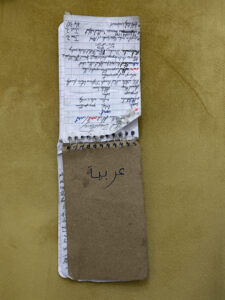 Things are starting to get comfortable here in Fez! We’ve spent over two weeks here, and the culture has become a bit more familiar to us. The daily routine is now set in stone, the local streets no longer feel strange, and I can order a coffee while only stumbling over my words a few times. My tiny notebook of Arabic and Darija phrases is tearing at the seams, but it is serving its purpose for now.
Things are starting to get comfortable here in Fez! We’ve spent over two weeks here, and the culture has become a bit more familiar to us. The daily routine is now set in stone, the local streets no longer feel strange, and I can order a coffee while only stumbling over my words a few times. My tiny notebook of Arabic and Darija phrases is tearing at the seams, but it is serving its purpose for now.
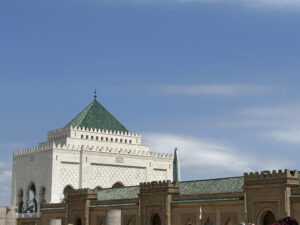 The highlight of our past week was not in Fez, however. We spent our weekend in the capital of Morocco, the Imperial City of Rabat. A crowning jewel in the Mediterranean, Rabat acts as a hub for international business and displays Morocco’s rich culture, dotted with monuments to the power of kings current and past. Medieval minarets and fortresses mark the coast alongside sleek modern offices and towering skyscrapers. The way that the city blends the old and the new is beautiful, and I wish I could spend longer there. It was inspiring to see cities like Fez and Rabat where people have lived for a thousand years, and I’m glad I had the opportunity to – very briefly – be a part of that story. Seeing the clean glass buildings next to massive stone walls felt like watching time pass in real-time.
The highlight of our past week was not in Fez, however. We spent our weekend in the capital of Morocco, the Imperial City of Rabat. A crowning jewel in the Mediterranean, Rabat acts as a hub for international business and displays Morocco’s rich culture, dotted with monuments to the power of kings current and past. Medieval minarets and fortresses mark the coast alongside sleek modern offices and towering skyscrapers. The way that the city blends the old and the new is beautiful, and I wish I could spend longer there. It was inspiring to see cities like Fez and Rabat where people have lived for a thousand years, and I’m glad I had the opportunity to – very briefly – be a part of that story. Seeing the clean glass buildings next to massive stone walls felt like watching time pass in real-time. 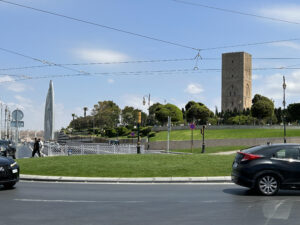
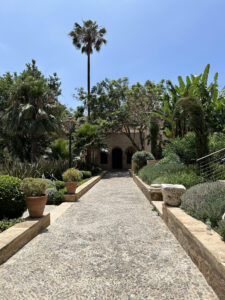 After wandering a Qur’an-accurate Garden of Eden, visiting the mausoleum of the late King Mohamed V, and being a part of a Moroccan wedding ceremony, we returned to Fez. Since then, we have simply been living. We go to classes, we do assignments, and we explore the city. As Americans, we were all surprised to see that nearly every business is open well after 10 PM. Children wander the streets and head home by midnight, and taxis keep running all night long. We normally go on a brief adventure, then grab food around 11 to be back in our apartments by midnight. It’s definitely a different lifestyle than what I had before! We have things to do, but they are much less set in stone. The freedom is exciting, but I’m struggling to figure out the best use of my time here. In my past few days, I’ve done my best to do things that I wouldn’t do in the United States: I’ve eaten plenty of Moroccan food, explored the winding streets of the medina, gathered as many Arabic phrases as possible, followed some of the locals on Instagram, and been to a specific Moroccan spa called a hammam. I feel familiar with the city now, and I feel much more comfortable navigating the place and the culture.
After wandering a Qur’an-accurate Garden of Eden, visiting the mausoleum of the late King Mohamed V, and being a part of a Moroccan wedding ceremony, we returned to Fez. Since then, we have simply been living. We go to classes, we do assignments, and we explore the city. As Americans, we were all surprised to see that nearly every business is open well after 10 PM. Children wander the streets and head home by midnight, and taxis keep running all night long. We normally go on a brief adventure, then grab food around 11 to be back in our apartments by midnight. It’s definitely a different lifestyle than what I had before! We have things to do, but they are much less set in stone. The freedom is exciting, but I’m struggling to figure out the best use of my time here. In my past few days, I’ve done my best to do things that I wouldn’t do in the United States: I’ve eaten plenty of Moroccan food, explored the winding streets of the medina, gathered as many Arabic phrases as possible, followed some of the locals on Instagram, and been to a specific Moroccan spa called a hammam. I feel familiar with the city now, and I feel much more comfortable navigating the place and the culture.
Unfortunately, my time in Morocco is up. We leave for Spain in a few hours (I’m writing this to put off packing) and will only be returning to Fez very briefly. I hope to come back one day, especially to explore places like Rabat more. For now, though, I’m excited for a new adventure in Spain! We’re going on a whirlwind tour of the south of Spain through Marbella, Málaga, and Ronda, three cities with historic connections to Morocco. Long ago, a Muslim kingdom called Al Ándalus held control of most of Spain, and the cultural remnants can still be seen in the language, architecture, and customs. I will do my best to enjoy the experience naturally, rather than spend the whole time drawing academic connections between Spain and Morocco.
That being said, I do need to pack now. Thanks for reading, and I can’t wait to update you on Spain!
June 21, 2024
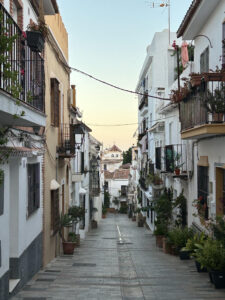 Spain has been a whirlwind! We started our weekend by traveling from Fez to the coast by driving four hours across picturesque deserts and occasional villages amidst towering mountain ranges. To get from Morocco to Spain, we took a ferry across the Strait of Gibraltar, getting a chance to see Africa behind us and Europe ahead of us – it reminded me of all the important historical events that happened in those waters. After the ferry ride, we landed in Tarifa, and then drove through the south of Spain – the landscape was strikingly similar to what we saw in Morocco. We ended that night in Marbella.
Spain has been a whirlwind! We started our weekend by traveling from Fez to the coast by driving four hours across picturesque deserts and occasional villages amidst towering mountain ranges. To get from Morocco to Spain, we took a ferry across the Strait of Gibraltar, getting a chance to see Africa behind us and Europe ahead of us – it reminded me of all the important historical events that happened in those waters. After the ferry ride, we landed in Tarifa, and then drove through the south of Spain – the landscape was strikingly similar to what we saw in Morocco. We ended that night in Marbella.
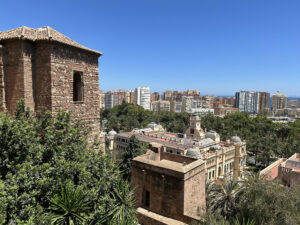 We stayed in the Spanish state of Andalusia, named after the former Islamic State of Al-Ándalus that once controlled a massive part of the country. After spending a few weeks in Morocco, it becomes easy to see the influence: the narrow mazelike streets, the use of tiles and mosaics, and the architectural styles all carry with them the legacy of their former stewards. In some places, it’s impossible to ignore. In Málaga, a massive fortress made by the Umayyad Caliphate towers over the entire city, competing for space in the skyline with cathedrals and modern skyscrapers. Even the Spanish language has loaned words like azúcar, ojalá, and zanahoría from the Arabic language that used to be the norm of the region. Andalucia is a real case study of how different cultures interact and change each other over time.
We stayed in the Spanish state of Andalusia, named after the former Islamic State of Al-Ándalus that once controlled a massive part of the country. After spending a few weeks in Morocco, it becomes easy to see the influence: the narrow mazelike streets, the use of tiles and mosaics, and the architectural styles all carry with them the legacy of their former stewards. In some places, it’s impossible to ignore. In Málaga, a massive fortress made by the Umayyad Caliphate towers over the entire city, competing for space in the skyline with cathedrals and modern skyscrapers. Even the Spanish language has loaned words like azúcar, ojalá, and zanahoría from the Arabic language that used to be the norm of the region. Andalucia is a real case study of how different cultures interact and change each other over time.
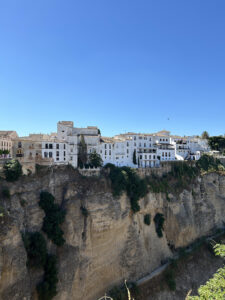 That was not our only education in cross-cultural communication in Spain, however. The town we stayed in, Marbella, is famous as an international tourist destination with its picturesque beaches and active nightlife, especially for wealthy families from the United Kingdom. We were surprised to find that English was very prominent in the city – in some parts, it was spoken more than Spanish.
That was not our only education in cross-cultural communication in Spain, however. The town we stayed in, Marbella, is famous as an international tourist destination with its picturesque beaches and active nightlife, especially for wealthy families from the United Kingdom. We were surprised to find that English was very prominent in the city – in some parts, it was spoken more than Spanish.
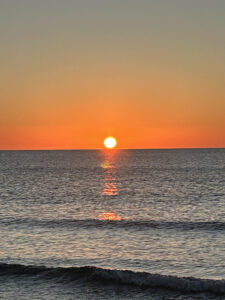 Even though Spanish culture is somewhat familiar to me as a Mexican, my experience with culture shock was much worse in Spain than in Morocco. Maybe it was a lack of preparation, maybe it was the stark difference between the two countries, and maybe it was the fact that Spain was almost familiar but not. No matter the reason, the more individual and defensive nature of the culture was a shock for me. The Spanish phrases I used there were not always understood, and if I didn’t actively try to speak Spanish with a Castellan accent people acted as if I was speaking another language.
Even though Spanish culture is somewhat familiar to me as a Mexican, my experience with culture shock was much worse in Spain than in Morocco. Maybe it was a lack of preparation, maybe it was the stark difference between the two countries, and maybe it was the fact that Spain was almost familiar but not. No matter the reason, the more individual and defensive nature of the culture was a shock for me. The Spanish phrases I used there were not always understood, and if I didn’t actively try to speak Spanish with a Castellan accent people acted as if I was speaking another language.
If we had spent more than a few days there, I would have been interested to see how long it would take to adapt. I truly want to give Spain a proper chance and spend more time trying to understand the culture. But only after a few short days, it was already time to go. I’m back in Fez now, enjoying my last bit of Moroccan Pizza Hut and packing before we return to the United States. My last big adventure before “true” adulthood is over, and now it’s time to think about my future after UMBC. Though I will miss this study abroad trip, the people I’ve met, the food I’ve tried, and the many lessons I’ve learned, I’m ready to begin the next stage of my life. If this experience has taught me anything, it’s that adaptability is the most important skill for overcoming difficult situations. It’s time for me to adapt one last time and settle back into my home country.
June 28, 2024 – Return Post
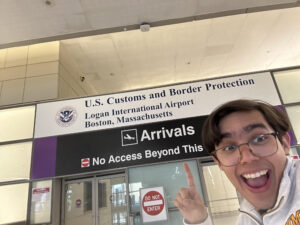 Our program for study abroad has finally come to an end. We spent a full day packing, and our host institute provided a massive farewell dinner before we left. Our last day in Morocco was spent in Casablanca waiting for our plane, and after a few delays we were finally on out way home. But halfway through the flight we were alerted that we would have to land in Boston! We were stuck hundreds of miles away from where we were supposed to land, tired, jetlagged, and confused. We were able to find a train that took us home, though, so it wasn’t too hard to problem-solve our way out of it. We just had to have one final adventure before ending our trip.
Our program for study abroad has finally come to an end. We spent a full day packing, and our host institute provided a massive farewell dinner before we left. Our last day in Morocco was spent in Casablanca waiting for our plane, and after a few delays we were finally on out way home. But halfway through the flight we were alerted that we would have to land in Boston! We were stuck hundreds of miles away from where we were supposed to land, tired, jetlagged, and confused. We were able to find a train that took us home, though, so it wasn’t too hard to problem-solve our way out of it. We just had to have one final adventure before ending our trip.
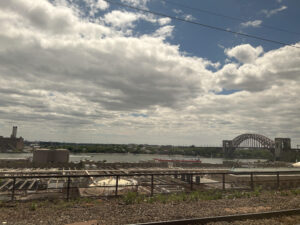
To be clear: if you study abroad, this should not happen to you. I am trying to get my money back from the airline. But I think that doing study abroad helps you be a bit more independent and prepares you for situations like this. It puts you in an unfamiliar place in a small group, and it forces you to learn how to live there. You’re forced to figure out local cultural norms, learn a bit of the local language, look for good food places, and find out how to get from place to place. It puts you into a constant state of learning, and you become more adaptable and capable because of it. I definitely had to put my adaptability to the test just to make it home.
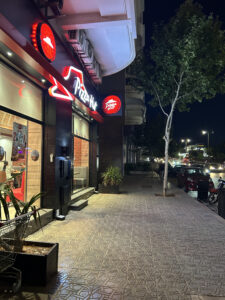 Though an unfamiliar environment is great for learning, it’s nice to be back in a familiar environment. I’m appreciating all of the time I get to sleep – my first night back, I slept 12 hours straight, then went back to sleep. Being able to cook and drive for myself are things that I didn’t expect to miss, but now I don’t know how I lived without them. And most of all, I missed the family pets. And my family too, I guess.
Though an unfamiliar environment is great for learning, it’s nice to be back in a familiar environment. I’m appreciating all of the time I get to sleep – my first night back, I slept 12 hours straight, then went back to sleep. Being able to cook and drive for myself are things that I didn’t expect to miss, but now I don’t know how I lived without them. And most of all, I missed the family pets. And my family too, I guess.
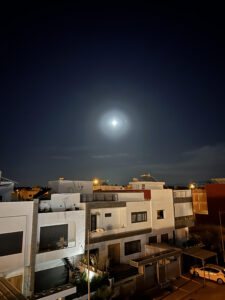 Studying abroad was a great way for me to test the skills that I learned in college. Universities are mostly meant to teach you academics, of course, but they also teach you how to set your own schedule and do work independently. It prepares you for a career and life you can lead on your own terms. Through study abroad, I tested myself academically to study in a stressful situation, even when I had limited internet connection and approaching deadlines. And I learned to be in a different cultural environment, far from home, where I needed to quickly figure out how to do things. And now, after this final challenge, I know that I am ready for anything that life will throw at me. I am grateful for this opportunity, and I am grateful for my time at UMBC. Thank you all for reading and going through this last adventure with me.
Studying abroad was a great way for me to test the skills that I learned in college. Universities are mostly meant to teach you academics, of course, but they also teach you how to set your own schedule and do work independently. It prepares you for a career and life you can lead on your own terms. Through study abroad, I tested myself academically to study in a stressful situation, even when I had limited internet connection and approaching deadlines. And I learned to be in a different cultural environment, far from home, where I needed to quickly figure out how to do things. And now, after this final challenge, I know that I am ready for anything that life will throw at me. I am grateful for this opportunity, and I am grateful for my time at UMBC. Thank you all for reading and going through this last adventure with me.